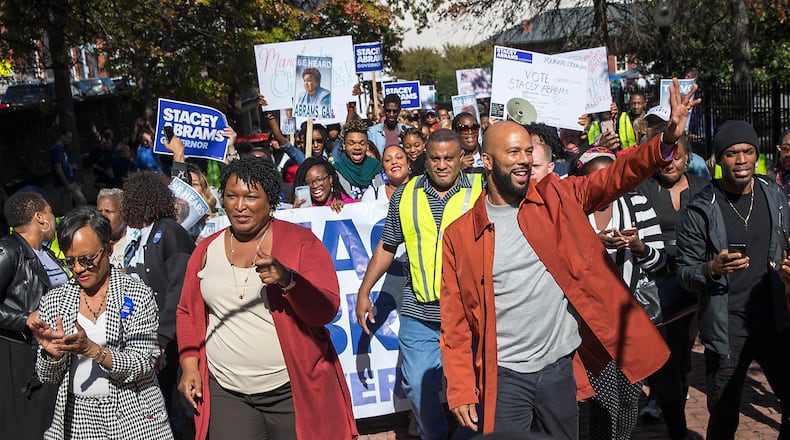The Sunday combination of church and voting, an election-year ritual especially embraced by Black congregations, is at risk in Georgia by a bill that would limit weekend voting hours.
The legislation targets Sunday voting, though there’s no suspicion of fraud or irregularities. The only disparity is that Sunday voting is offered primarily in heavily Democratic counties, where local governments were more willing to spend tax money to staff polling places on weekends.
Among many proposed voting measures in Georgia, restrictions on Sunday voting stand out for their racial and partisan impact. About 37% of voters on two Sundays in October were Black, higher than their 30% share of Georgia’s registered voters, according to state election data.
Since Georgia has become a battleground state, with the presidential election decided by just 12,000 votes, new voting laws have the potential to change the outcomes of close elections in coming years.
Church leaders say curbing Sunday voting is intended to hinder Black voters, who overwhelmingly favor Democratic Party candidates. Friends and neighbors go to church together, then travel in a caravan of cars or buses to vote, an event known as “Souls to the Polls.”
“It is directly aimed at the African American church that has mobilized and utilized Souls to the Polls in the most effective way. There’s no doubt about it,” said the Rev. Fer’Rell Malone, senior pastor for Macedonia Baptist Church in Waycross. “They recognize that the Black or brown vote has an enormous amount of power.”
Republicans say the bill is about fairness and equal access to voting. Under House Bill 531, county election officials could choose to hold early voting on one Sunday, at most. Counties are currently allowed to offer voting on any of four weekend days.
“We wouldn’t try to disenfranchise or suppress anything. We’re trying to fix a system that’s broke,” said state Rep. Alan Powell, R-Hartwell, a co-sponsor of the bill. “The voters in Hart County need to be treated the same as voters in Fulton and DeKalb. The election process needs to be the same.”
Georgia lawmakers are considering a dozen bills that would change voting rules after the presidential election, including proposals to end no-excuse absentee voting, require more ID from absentee voters, and constrain the use of ballot drop boxes.
Over 71,000 people in 26 counties voted on Sundays during early voting in October, according to state voting records.
Most Sunday ballots were cast in metro areas that lean Democratic, such as DeKalb, Fulton, Gwinnett and Muscogee counties. Several counties that went for Republican President Donald Trump also provided Sunday voting, including Camden, Floyd, Lowndes and Monroe counties.
House Speaker Pro Tem Jan Jones, R-Milton, said she wants to improve uniformity in Georgia’s voting laws.
“This accommodates, in this legislation, the very few counties that want to offer Sunday early voting,” Jones said during a speech in the House. “The data shows it’s the least-used voting day by a long shot, but they’ll be able to offer it if they want to.”
Under existing Georgia law, all counties are required to offer early voting on one Saturday, and some counties offer additional weekend voting days.
HB 531 would impose a second mandatory weekend voting day statewide, either a Saturday or a Sunday, which would have the effect of increasing voting options in rural Republican areas and decreasing them in urban Democratic counties. Counties might not continue to provide Sunday voting if they opt for Saturday voting instead.
The bill could also result in fewer early voting hours during the week. It sets the default voting hours from 9 a.m. to 5 p.m. and gives counties the option to hold polls open from 7 a.m. to 7 p.m.
Lauren Groh-Wargo, CEO of the voting rights group Fair Fight, called the legislation “the worst voter suppression since Jim Crow.”
“These attacks on the right to vote that target voters of color and that will undermine election integrity for all clearly illuminate why we need federal action urgently to protect Georgians’ constitutional right to vote,” Groh-Wargo said.
The Rev. Lee May, the former CEO of DeKalb County, said he has seen the success of Sunday voting since it started there in 2014. He compared proposals to scale back Sunday voting to poll taxes or literacy tests.
“There’s no rationale for it other than you’re trying to prevent Black folks who utilize that,” said May, pastor for Transforming Faith Church.
While it’s difficult to quantify the effect of constraining weekend voting days, options would be reduced in some Democratic counties and expanded in mostly Republican counties. Sunday voters made up 3% of 2.7 million total in-person early voters in Georgia.
Both parties agree that Democrats will use the issue to motivate their voters in the 2022 election for governor.
HB 531 passed the state House last week and is pending in the Senate Ethics Committee.
About the Author
Keep Reading
The Latest
Featured




